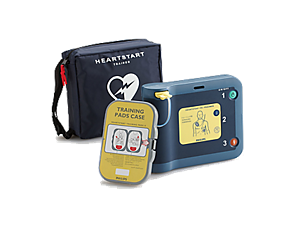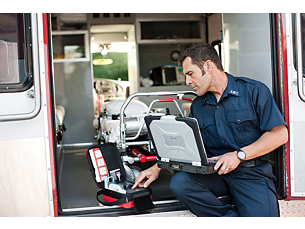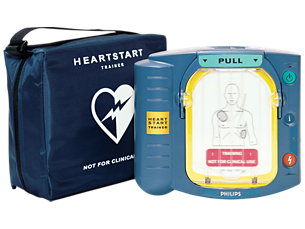Specifications
- Product specifications
-
Product specifications Model Number - 861304
Therapy - Adult defibrillation peak current: 32A (150J nominal) into a 50 ohm load. Pediatric defibrillation (with optional Infant/Child Key installed): 19A (50J nominal) into a 50 ohm load.
Battery - Typically 4 years when stored and maintained according to directions provided in Owner’s Manual. Standby life (after insertion):
Waveform - Truncated Exponential Biphasic. Waveform parameters adjusted as a function of each patient’s impedance.
Protocol - Protocol Device follows preconfigured settings. Defibrillation and CPR protocol can be customized using HeartStart Event Review or HeartStart Configure software.
Quick Shock - Able to deliver a shock after the end of a CPR interval, typically in eight seconds.
-
- Physical requirements
-
Physical requirements Size - 2.4 x 7.1 x 8.9 inches (6 x 18 x 22 cm) H x D x W
Weight - With battery and pads case: 3.5 lbs (1.5 kg) Without battery or pads case: 2.6 lbs (1.2 kg)
-
- Environmental
-
Environmental Temperature - Operating/Standby:32° - 122° F (0° - 50° C)
EMI (Radiated/Immunity) - CISPR II Group I Class B, IEC 61000-4-3, and IEC 61000-4-8
Sealing - Waterjet proof IPX5 per IEC60529 Dust protected IPX5 per IEC60529
Altitude - 0 to 15,000 feet
Aircraft - Device: RTCA/DO-160D;1997
Crush - 500 pounds
Vibration - Operating: meets MILSTD 810F Fig.514.5C-17, random Standby: meets MILSTD 810F Fig.514.5C-18,swept sine.
-
- Product specifications
-
Product specifications Model Number - 861304
Therapy - Adult defibrillation peak current: 32A (150J nominal) into a 50 ohm load. Pediatric defibrillation (with optional Infant/Child Key installed): 19A (50J nominal) into a 50 ohm load.
-
- Physical requirements
-
Physical requirements Size - 2.4 x 7.1 x 8.9 inches (6 x 18 x 22 cm) H x D x W
Weight - With battery and pads case: 3.5 lbs (1.5 kg) Without battery or pads case: 2.6 lbs (1.2 kg)
-
- Product specifications
-
Product specifications Model Number - 861304
Therapy - Adult defibrillation peak current: 32A (150J nominal) into a 50 ohm load. Pediatric defibrillation (with optional Infant/Child Key installed): 19A (50J nominal) into a 50 ohm load.
Battery - Typically 4 years when stored and maintained according to directions provided in Owner’s Manual. Standby life (after insertion):
Waveform - Truncated Exponential Biphasic. Waveform parameters adjusted as a function of each patient’s impedance.
Protocol - Protocol Device follows preconfigured settings. Defibrillation and CPR protocol can be customized using HeartStart Event Review or HeartStart Configure software.
Quick Shock - Able to deliver a shock after the end of a CPR interval, typically in eight seconds.
-
- Physical requirements
-
Physical requirements Size - 2.4 x 7.1 x 8.9 inches (6 x 18 x 22 cm) H x D x W
Weight - With battery and pads case: 3.5 lbs (1.5 kg) Without battery or pads case: 2.6 lbs (1.2 kg)
-
- Environmental
-
Environmental Temperature - Operating/Standby:32° - 122° F (0° - 50° C)
EMI (Radiated/Immunity) - CISPR II Group I Class B, IEC 61000-4-3, and IEC 61000-4-8
Sealing - Waterjet proof IPX5 per IEC60529 Dust protected IPX5 per IEC60529
Altitude - 0 to 15,000 feet
Aircraft - Device: RTCA/DO-160D;1997
Crush - 500 pounds
Vibration - Operating: meets MILSTD 810F Fig.514.5C-17, random Standby: meets MILSTD 810F Fig.514.5C-18,swept sine.
-
- 1. Nichol, G., Sayre, M. R., Guerra, F., & Poole, J. (2017). Defibrillation for Ventricular Fibrillation: A Shocking Update., 70(12), 1496-1509. Journal American College of Cardiology doi:10.1016/j. jacc.2017.07.778
- 2. Eftestol, T., Sunde, K., & Steen, P. A. (2002). Effects of interrupting precordial compressions on the calculated probability of defibrillation success during out-of-hospital cardiac arrest. Circulation, 105(19), 2270-2273. doi:10.1161/01. CIR.0000133323.15565.75
- 3. Yu, T., Weil, M. H., Tang, W., Sun, S., Klouche, K., Povoas, H., & Bisera, J. (2002). Adverse outcomes of interrupted precordial compression during automated defibrillation. Circulation, 106(3), 368-372. doi:10.1161/01.CIR.0000021429.22005.2E
- 4. Snyder, D., & Morgan, C. (2004). Wide variation in cardiopulmonary resuscitation interruption intervals among commercially available automated external defibrillators may affect survival despite high defibrillation efficacy. Critical Care Medicine, 32(9 Suppl), S421-S424. doi:10.1097/01.CCM.0000134265.35871.2B
- 5. Edelson, D. P., Abella, B. S., Kramer-Johansen, J., Wik, L., Myklebust, H., Barry, A. M., . . . Becker, L. B. (2006). Effects of compression depth and pre-shock pauses predict defibrillation failure during cardiac arrest. Resuscitation, 71(2), 137-145.



